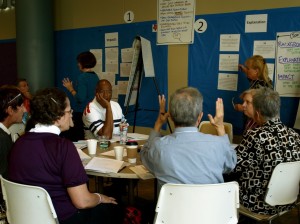Researcher: Analysis of GMO labeling initiative unbiased
by Jeff Dodge | October 15, 2014 3:14 PM

A research team led by a Colorado State University faculty member has found that a new citizens’ review of the initiative to require labeling of genetically modified organisms (GMOs) was largely fair and unbiased.
Proposition 105, which will appear on the Nov. 4 ballot in Colorado, would require, with several exceptions, “food that has been genetically modified or treated with genetically modified material to be labeled ‘Produced With Genetic Engineering’ starting on July 1, 2016.”
Last month, in a pilot program of a voter-led ballot review process launched in Oregon, 20 Colorado voters randomly selected to reflect the state’s voting population assessed Proposition 105. The panel met Sept. 7-10 at the University of Colorado Denver with public policy firm Engaged Public and facilitators from Civic Canopy to research the issue and ask questions of advocates on both sides.
At the end of their deliberations, the voters issued a report that includes key findings agreed to by a supermajority of the panel as well as statements for and against the measure. The pilot program, called the Citizens’ Initiative Review, is also being conducted in Arizona and Washington. It was funded by Healthy Democracy, the Oregon nonprofit that developed the CIR in that state in 2010.
NSF grant
Katherine Knobloch, an assistant professor in CSU’s Department of Communication Studies[1], and John Gastil of Pennsylvania State University received $418,000 from the National Science Foundation to assess the fairness and impartiality of the pilot program and its impact on the electorate.
They conducted similar reviews of the process in 2010 and 2012 in Oregon, where the CIR has been written into law to be part of the state’s official voting guide. About 50 percent of Oregonians reported using the CIR statement when casting their ballot, and of those, two-thirds said the statement was helpful to them in deciding whether to support selected ballot initiatives.
In the review, Knobloch worked with Stephanie Bor of the University of Colorado Denver School of Public Affairs and Leah Sprain of the University of Colorado Boulder communication department to record the panel’s proceedings and survey panelists at the end of each day about issues like moderator bias and the balance of time afforded to each side.

According to the research group’s initial report, all but one panelist reported high or very high satisfaction with the process, and the vast majority said the moderators were neutral and that both sides were given equal time. Most panelists also said they were given equal opportunity to speak, were able to understand the discussions and carefully considered views different from their own. The findings are similar to what was found in Oregon’s CIR, Knobloch said.
“We look at whether the process favors one side or the other, and we generally find that it does not,” she explained.
Knobloch said their research shows that just knowing that the CIR exists can increase voters’ confidence in the government and in their own ability to self-govern.
Her group will also evaluate what impact the panel’s findings have on voters, as well as citizens’ views of Colorado’s official “blue book” voting guide.
‘Informed decisions’
“The public needs the maximum amount of information possible to make informed decisions on ballot initiatives that have great consequences and long-term impact on the state,” said Brenda Morrison of Engaged Public, project director for the Colorado CIR pilot. “Our pilot evaluates the effectiveness of the citizen jury model in helping Coloradans thoughtfully consider ballot measures, cut through the sound bites and advertisements, and make fact-based voting decisions.”
“Coloradans are looking for trustworthy information when they go to vote, and the CIR provides an additional resource that has been evaluated independently as high-quality, fair and effective in breaking down complex ballot measures for voters,” said Tyrone Reitman, executive director of Healthy Democracy. “Colorado’s pilot will add to the body of research being collected on this voter education tool.”
- Department of Communication Studies: http://communicationstudies.colostate.edu/
Source URL: https://source.colostate.edu/researcher-citizen-review-gmo-labeling-initiative-unbiased/
Copyright ©2024 SOURCE unless otherwise noted.